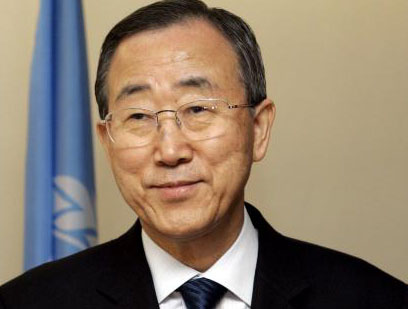For the past year and a half, our world has seen more protests, revolutions and uprisings than ever before. It’s been a time of action, justice and change, and people around the world have been taking a stand to advocate for their right to live as free citizens in their own countries. Though so much of this social action has resulted in positivity, we were reminded yesterday on World Refugee Day that there is still so much progress to be made.
Over 42 million people around the world have been displaced and over 1 million others have been forced to leave their countries because of dangerous violence and conflict.
U.N. Secretary General Ban Ki-Moon made a special statement yesterday in honor of all those still affected, and he reminded us why we continue to work toward our goal of seeing an end to LRA violence and that there is still work to be done all over the world.
Here is the full statement from Ban Ki-moon:
More than 42 million people around the world have been forcibly displaced from their homes and communities. More than a million fled their countries in the last eighteen months alone due to a wave of conflicts, in Côte d’Ivoire, Libya, Mali, Somalia, Sudan and Syria. These numbers represent far more than statistics; they are individuals and families whose lives have been upended, whose communities have been destroyed, and whose future remains uncertain.
World Refugee Day is a moment to remember all those affected, and a time to intensify our support.
Four out of five refugees are in developing countries, and have benefitted from the remarkable generosity of host countries that themselves face serious deprivations. The Islamic Republics of Pakistan and Iran host the largest number of refugees, with over two and half million between them. Tunisia and Liberia are also among countries that, despite their own national challenges, maintained open borders and shared scarce water, land and other resources for those suffering the impact of armed violence.
Kenya’s third biggest city is a refugee camp and hosts over half a million Somalis, many in their third decade of exile. Niger, Mauritania, and Burkina Faso — suffering famine and drought — now host some 175,000 refugees fleeing conflict in Mali. These countries cannot be left to shoulder this burden alone.
The United Nations — and in particular the office of the UN High Commissioner for Refugees — is working to address all of these challenges, while also providing protection and assistance to 15.5 million persons displaced within their own countries. We are also focusing on preventing and reducing statelessness. But humanitarian assistance is not enough.
The recent UNHCR Global Trends report shows that displacement is outpacing solutions. We must work together to mobilize the political will and leadership to prevent and end the conflicts that trigger refugee flows. Where security is restored, we must address the underlying causes of conflict, allowing sustainable refugee return through access to livelihoods, services and the rule of law.
Despite budget constraints everywhere, we must not turn away from those in need. Refugees leave because they have no choice. We must choose to help.
Ban Ki-moon

Think people should hear about this?